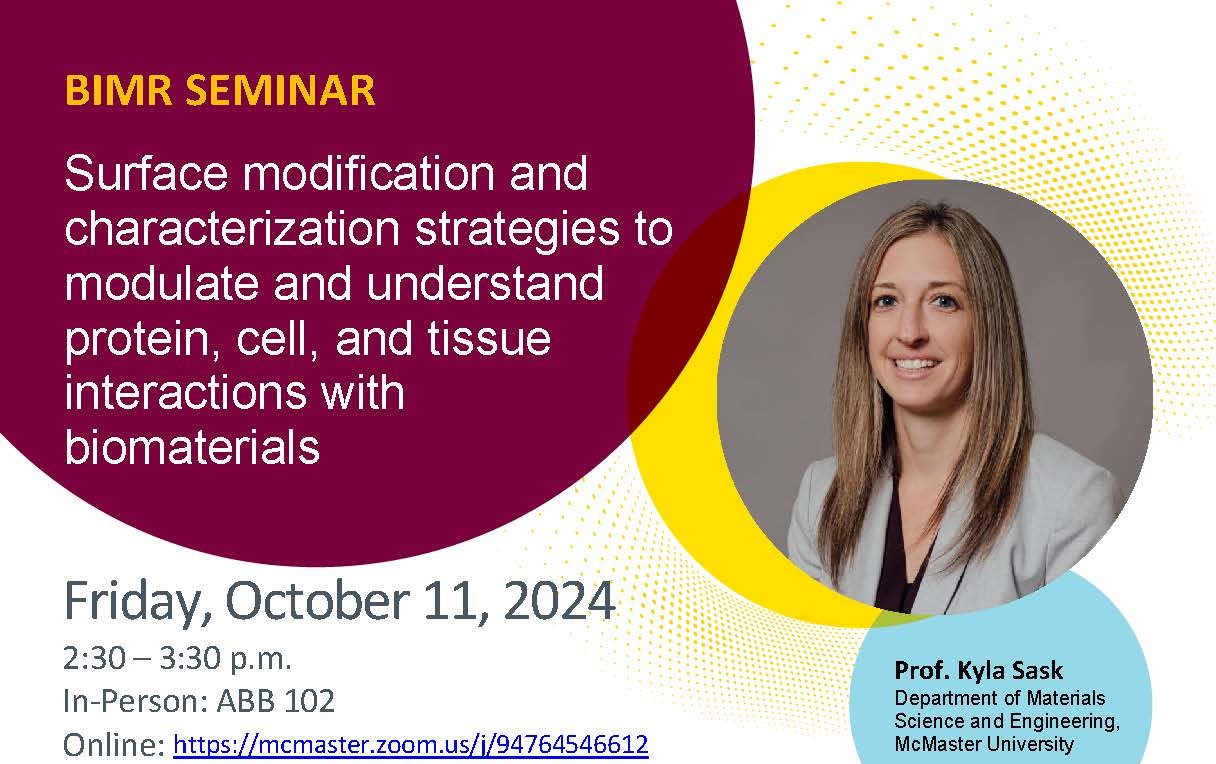Surface modification and characterization strategies to modulate and understand protein, cell, and tissue interactions with biomaterials
Oct 11, 2024
2:30PM to 3:30PM

Date/Time
Date(s) - 11/10/2024
2:30 pm - 3:30 pm
Categories
Prof. Kyla Sask
Department of Materials Science and Engineering, McMaster University
Blood contacting biomaterials are needed in various applications including diagnostic devices, catheters, stents, oxygenators, and tissue-engineered devices, among others. Implants intended for other locations in the body will also contact blood initially, for example in bone-interfacing applications. Blood-biomaterial interactions are complex and initial protein adsorption leads to subsequent cellular responses and adverse reactions including thrombosis, inflammation, and infection. Work in the K. Sask research group is applying multifunctional surface modifications to materials including polydimethylsiloxane (PDMS), polyurethanes (PUs), and model materials such as gold. Mussel-inspired PDA coatings are used to functionalize surfaces with various biological molecules, including plasma proteins such as fetuin-A. We have developed a dual surface functionalization strategy to modify PDMS with the anticoagulant antithrombin-heparin (ATH) and the fibrinolytic agent tissue plasminogen activator (t-PA) and have demonstrated enhanced antithrombotic activity. We have also developed a method to directly functionalize the surface of PDMS and PU with diazirine molecules to enhance the quantity and stability of immobilized proteins. Finally, we are developing techniques to characterize interactions at the interface using advanced microscopy, protein radiolabelling, and modified immunoassays for visualizing, quantifying and determining the structure of proteins, respectively. This research is leading to enhanced knowledge and techniques for improved blood contacting devices.
Bio:
Dr. Kyla Sask has been an Assistant Professor in the Department of Materials Science and Engineering at McMaster since 2019. She is an Associate Member of the School of Biomedical Engineering and the Department of Pathology and Molecular Medicine. Dr. Sask obtained her BSc in Chemical Engineering from Queen’s University in 2006 and her PhD in Biomedical Engineering from McMaster University in 2012. She completed a postdoctoral fellowship at Queen’s University from 2018-2019. Between her PhD and PDF, Dr. Sask spent several years working at Interface Biologics (now Evonik and Ripple Therapeutics) in Toronto, developing innovative materials to improve the efficacy of medical devices. She has supervised 30 HQP, has authored 21 peer reviewed articles, two book chapters, 28 conference publications, and filed two patent applications. She has received funding from NSERC, CIHR, Mitacs, CFI, NFRF, and others. Dr. Sask’s current research program focuses on biomaterial surface modification, advanced characterization, protein and cell interactions, blood compatibility, nanomaterials, and biosensors.
In-Person: ABB 102
Online: https://mcmaster.zoom.us/j/94764546612
Meeting ID: 947 6454 6612
Passcode: 111279

